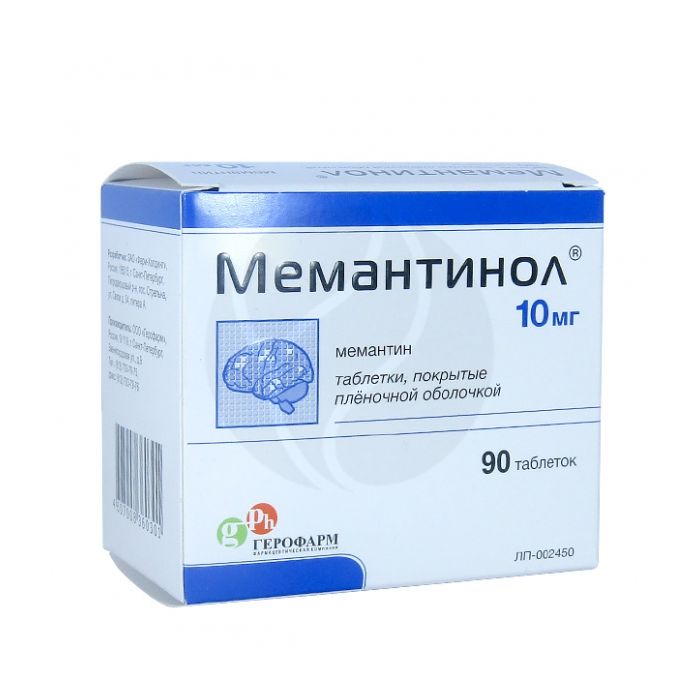Memantinol 10mg, No. 90
Expiration Date: 11/2025
Russian Pharmacy name:
Мемантинол 10мг, №90
Moderate to severe dementia of the Alzheimer's type.
Inside, 1 time per day and always at the same time, regardless of the meal.
Memantine treatment should be initiated and supervised by a physician experienced in diagnosing and treating dementia in Alzheimer's disease. The diagnosis should be made in accordance with current guidelines. Treatment should only be started if the patient's caregiver regularly monitors the drug. The tolerance and dosage of memantine should be regularly reviewed, preferably within the first 3 months from the start of therapy. After this period, the clinical efficacy of memantine and the patient's tolerance to treatment should be regularly reviewed in accordance with current clinical guidelines. Supportive treatment can be continued indefinitely if there is a positive effect of the therapy and good tolerability of the treatment.Reception of memantine should be discontinued in the absence of a positive therapeutic effect or patient intolerance to treatment.
Adults
Dose titration. The maximum daily dose is 20 mg / day. In order to reduce the risk of adverse reactions, the dose of the drug is titrated by successively increasing it by 5 mg every week for the first 3 weeks: during the 1st week of therapy (days 1 to 7), the patient should take memantine at a dose of 5 mg / day (0.5 tab.10 mg), during the 2nd week (days from 8th to 14th) - at a dose of 10 mg / day (1 tab.10 mg), during the 3rd weeks (days from 15th to 21st) - at a dose of 15 mg / day (1.5 tab. 10 mg). Starting from the 4th week, the patient is prescribed memantine at a dose of 20 mg / day (2 tablets, 10 mg each). The recommended maintenance dose is 20 mg / day.
Special patient groups
Elderly age (over 65). No dose adjustment is required.
Impaired renal function. In patients with Cl creatinine 50Ц80 ml / min, dose adjustment is not required. For patients with moderate renal insufficiency (Cl creatinine 30Ц49 ml / min), the recommended daily dose is 10 mg / day. If this dose is well tolerated for 7 days, it can be increased to 20 mg / day in accordance with the standard titration schedule. In patients with severe renal insufficiency (Cl creatinine 5Ц29 ml / min), the daily dose should not exceed 10 mg / day.
Liver dysfunction. In patients with mild to moderate hepatic impairment (class A and class B on the Child-Pugh scale), dose adjustment is not required. There are no data on the use of memantine in patients with severe hepatic impairment; therefore, the administration of memantine to such patients is not recommended.
| Film-coated tablets | 1 tab. |
| active substance: | |
| memantine hydrochloride | 10 mg |
| excipients: lactose monohydrate - 169 mg; MCC - 40 mg; colloidal silicon dioxide - 1.2 mg; sodium starch glycolate (type A) - 10 mg; hydroxypropyl cellulose - 7.4 mg; magnesium stearate - 2.4 mg | |
| film shell: Opadry II white OY-L-28900 (lactose monohydrate - 36%, hypromellose - 28%, titanium dioxide - 26%, macrogol 4000 - 10%) - 7 mg |
individual hypersensitivity to memantine or any of the components that make up the drug;
lactase deficiency, lactose intolerance, glucose-galactose malabsorption syndrome, because MemantinolЃ contains lactose;
pregnancy;
breastfeeding period;
age up to 18 years (efficacy and safety have not been established).
With care: thyrotoxicosis, epilepsy, a predisposition to the development of seizures (including a history); the simultaneous use of other antagonists of NMDA receptors (amantadine, ketamine, dextromethorphan), the presence of factors that increase the pH of urine (a sharp change in diet, for example, switching to vegetarianism, abundant intake of alkaline gastric buffers); renal tubular acidosis; severe urinary tract infections caused by bacteria of the genus Proteus; myocardial infarction (history); heart failure III Ц IV functional class (NYHA classification); uncontrolled arterial hypertension; renal failure; liver failure.

